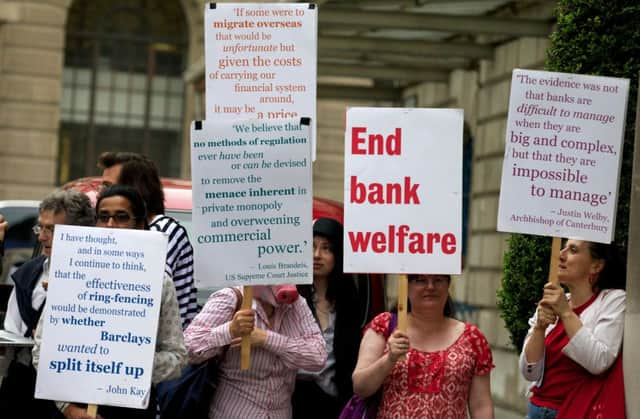Rise in bank levy pays for ‘giveaway’ Budget


Chancellor George Osborne said that the finance sector was “one of Britain’s most important and successful industries, employing people in every corner of the country”, but he would be asking banks to “contribute more” to the wider economic recovery.
Using yesterday’s Budget speech to announce an increase in the bank levy from 0.156 per cent to 0.21 per cent from 1 April, the Chancellor said that this move would raise an additional £900 million a year.
Advertisement
Hide AdAdvertisement
Hide AdHe added: “We will also stop banks from deducting from corporation tax the compensation they make to customers for products they have been mis-sold, like PPI. Taken together these new banking taxes will raise £5.3bn across the forecast.
“The banks got support going into the crisis; now they must support the whole country as we recover from the crisis.”
Susie Walker, head of tax at accountant Johnston Carmichael, said the increased pressure on the banks did not come as a surprise, particularly since state-backed Lloyds recently announced that it would be resuming dividend payments.
She added: “The bulk of the ‘giveaways’ announced in the Budget are being funded by the banks. To balance this slightly, there will be no obligation to deduct basic rate tax from non-Isa savings income from April 2016. It’s a huge administrative burden and difficult to get right.”
Forecasts published by the Treasury estimate that the increase in the bank levy – introduced in 2011 at a rate of 0.05 per cent – would bring in an extra £685m this year, rising to £925m in 2016-17.
Lynne Sneddon, tax partner for financial services at EY Scotland, said: “This is a three-fold increase in the bank levy in just four years and once again is anti-competitive for our own UK banks. It will hit UK headquartered banks hardest as it’s a tax on their entire global balance sheets, whereas foreign banks in the UK are only taxed on their UK liabilities.
“The constant tinkering with the tax regime for banks in the UK is unhelpful, and in the long-term unsustainable – the industry will definitely be looking for a commitment to a more certain tax environment in the future.”
Tom Aston, financial services tax partner at KPMG, also said that the increase in the bank levy increase would be painful for global banks which have their headquarters in the UK.
Advertisement
Hide AdAdvertisement
Hide AdHe said: “It will be a case of one step forward two steps back for banks who are trying to deliver cost-cutting commitments. It is disappointing given that the tougher rules on banks using tax losses announced in the Autumn Statement were supposed to be in place of a higher bank levy.”
The increase in the bank levy was described as “optimistic” by Dimitris Andriosopoulos, senior lecturer in accounting and finance at Strathclyde Business School, who highlighted lenders’ current “fragile capital needs”.
“Besides, the banks are still struggling to get fully back on track with healthy profitability and to deliver a robust balance sheet,” Andriosopoulos said.
“Additionally, there may be some resistance on this increase by the rest of the financial services sector.”
Meanwhile, the move to prevent compensation payments being set off against corporate tax is expected to raise an additional £150m this year, increasing to £260m next year, before reducing to £225m in 2017-18.
The Treasury said: “The government believes that it is unacceptable that banks’ corporation tax receipts continue to be depressed by compensation associated with widespread misconduct in the sector. The government therefore intends to make these compensation payments non-deductible for corporation tax purposes through legislation in a future finance bill.”
David Hillman, spokesman for the Robin Hood Tax campaign, said: “George Osborne is right to ask the financial sector to pay more – but the bank levy increase falls short of the mark.
“It’s an affront to ordinary people who paid such a heavy price for the crisis that banks contribute so little – a fraction of the outlandish bonuses they continue to dole out.
Advertisement
Hide AdAdvertisement
Hide Ad“George Osborne cannot claim ‘we are all this together’ until banks are made to pay their fair share.”
However, British Bankers’ Association chief executive Anthony Browne said the levy is imposing a “significant cost” on the industry, forcing jobs overseas and deterring international lenders from investing in the UK.
“This increase in the bank levy is likely to accelerate that process and damage the competitiveness of the UK economy,” Browne said. “This will also further disadvantage UK headquartered banks by increasing tax on their overseas activities, while their competitors in those markets do not pay this tax at all.”
SUBSCRIBE TO THE SCOTSMAN’S BUSINESS BRIEFING